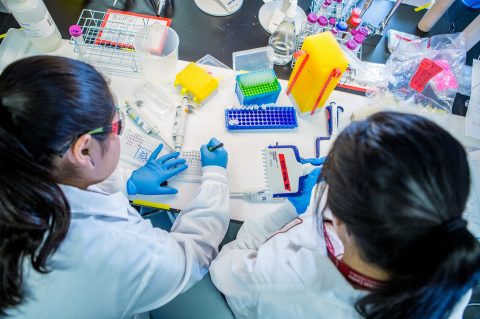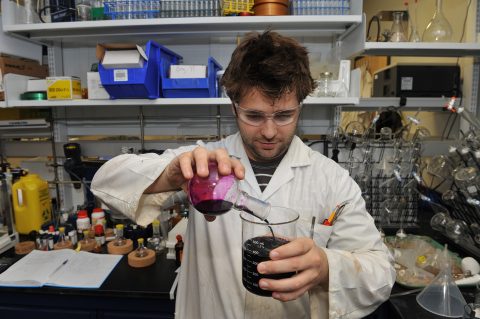Biochemistry (BSc)
Why study Biochemistry?
Biochemistry may not give you the answers to the meaning of life, but it can tell you how life works. As a biochemist, you will study the chemical processes that occur within the cells of living organisms. You could use your knowledge of cellular processes and molecular inheritance to combat disease, engineer pest-resistant crops, or develop microorganisms to clean up oil spills.
Our state-of-the-art labs and equipment include the Biomolecular Function, Interactions and Structure facility (BIOFINS) which houses a collection of instruments that is unique in Eastern Canada. Small class sizes foster strong student–professor relationships, and our teaching labs introduce you to the techniques used in the field. You will also:
- Study the role of proteins, carbohydrates and lipids in cellular processes
- Examine biochemical responses to toxic compounds in the environment
- Receive extensive training in research methodology
- Perform original research as an undergraduate (honours and specialization students only)
Concordia’s honours and specialization in Biochemistry programs are accredited by the Ordre des chimistes du Québec.
Program highlights
- Access to state-of-the-art labs and equipment including the Biomolecular Function, Interactions and Structure facility (BIOFINS)
- Small class sizes
- Honours and specialization options are accredited by the Ordre des chimistes du Québec
Special funding for out-of-province students
Up to $4000 for undergraduate programs.
Program structure
A Bachelor of Science degree takes a minimum of three or four years (90–120 credits) of full-time study, depending on your academic background.
Program options
- Honours in Biochemistry (72 credits)*
- Specialization in Biochemistry (69 credits)
- Major in Biochemistry (45 credits)
*Honours is a highly concentrated program, ideal for students planning to continue to graduate studies. If you are interested in Honours, speak with your program advisor in your first year of study at Concordia. Students applying to the University are able to apply to the major or specialization.
Courses
Each of our programs comprises a core component taken by all students. Specialization and honours students take additional courses at the intermediate and advanced levels.
Co-op program
The Co-op program gives you the chance to complete paid work terms that last 12 to 16 weeks. As a Co-op student, you will work for firms where you may:
- Analyze anti-viral compounds
- Clone and express genes
- Perform cell culture, receptor and enzyme assays
- Detect biomolecular interactions
Note: The Co-op program is only available for the Specialization and Honours.
United States students: A U.S. Federal Student Aid-eligible version of this program is offered. This version meets all U.S. regulations (such as no co-operative education or e-courses) for eligible programs.
Admission criteria
Minimum cut-off averages and course requirements
- Quebec CEGEP:
Specialization: 25
Major: 23
- Admission is based on the CRC requirements indicated above and completion of the following classes as part of their DEC: Calculus 1 and Calculus 2; Mechanics, Electricity and Magnetism and Wave, Optics and Modern Physics; General Chemistry and Chemistry of Solutions; General Biology (OR Cellular Biology AND Ecology and Evolution)
- Additional information for CEGEP applicants
- High School:
Specialization: B overall, B in math / sciences
Major: C+ overall, C+ in math / sciences- Completed courses in the disciplines of Calculus, Biology, Chemistry and Physics.
- One math from Pre-Calculus, Calculus, or equivalent
- Two sciences (from Biology, Chemistry or Physics)
- ACT or SAT is NOT required
- Canadian curricula course requirements
- Accepted international qualifications
- Completed courses in the disciplines of Calculus, Biology, Chemistry and Physics.
- International Baccalaureate (IB) diploma:
Specialization: 29 overall, 4 HL or 5 SL math, 5 HL science
Major: 26 overall, 4 HL or SL math, 4 HL science- one math (Applications and Interpretations HL, Analysis and Approaches HL or Analysis and Approaches SL)
- one science (Physics, Chemistry or Biology, either SL or HL)
- one of the science or math courses must be completed at the HL level
- International Baccalaureate Career-related Programme (CP):
Specialization: 4.8/7 overall, 4 HL or 5 SL math, 5 HL science
Major: 4.3/7 overall, 4 HL or SL math, 4 HL science- one math (Applications and Interpretations HL, Analysis and Approaches HL or Analysis and Approaches SL)
- one science (Physics, Chemistry or Biology, either SL or HL)
- one of the science or math courses must be completed at the HL level
- Additional Career-related Programme (CP) course requirements
- Baccalauréat français:
Specialization: 13 overall, 13 in math / science
Major: 11 overall, 11 in math / science- Première: Spécialité mathématiques AND Spécialité physique-chimie
Terminale: Spécialité mathématiques (also accepted, Spécialité Physique-Chimie AND Mathématiques Complémentaires)
- Première: Spécialité mathématiques AND Spécialité physique-chimie
- British system of education (GCE):
- A-levels:
Specialization: At least two A-level exams CD, C in math, C in science
Major: At least two A-level exams CD, C in math, D in science
or - AS-levels: At least 4 AS-level exams with equivalent results or
- BTEC: Level 3 Diploma or Extended Diploma in a related subject area with equivalent results
- Students without math or science A-levels may be admissible based on AS-level or iGCSE/GCSE/O-Level exam results. Students should include all their exam results from iGCSE (or equivalent) onwards to support their application.
- Additional information for British System of Education (GCE) applicants
- A-levels:
- University Transfers (internal/external):
Specialization: B overall, B in math / sciences
Major: C overall, C in math / sciences- Completed courses in the disciplines of Calculus, Biology, Chemistry and Physics.
Minimum cut-off averages should be used as indicators. The cut-off data may change depending on the applicant pool. Applicants who meet the stated minimum requirements are not guaranteed admission to these programs.
Application deadlines

FALL ENTRY (September)
Deadline: March 1
U.S. and international applicants: Apply no later than February 1 to allow time for immigration document processing. However, applying earlier is strongly recommended. Immigration processing times vary by country and delays could prevent you from starting your studies on time.

WINTER ENTRY (January)
Deadline: November 1
U.S. and international applicants: Apply no later than August 1 to allow time for immigration document processing. However, applying earlier is strongly recommended. Immigration processing times vary by country and delays could prevent you from starting your studies on time.
We reserve the right to close admission to a program at any time after the official deadline without prior notice.
Student story

Paria Asadi
Honours in Biology
Fuelled by a passion for helping others, Paria Asadi dove headfirst into disease research at Concordia.
Other programs of interest

Get inspired by life. Immerse yourself in the study of life at all levels: from the edge of biochemistry through cell biology and the physiology of multicellular organisms to the interactions between organisms and their environment.
Department
Faculty

As a chemist, your mastery of chemical reactions could lead to the creation of environmentally-friendly materials like compostable plastics or medications that fight disease.
Department
Department of Chemistry and Biochemistry
Faculty

Get inspired by life. Immerse yourself in the study of life at all levels: from the edge of biochemistry through cell biology and the physiology of multicellular organisms to the interactions between organisms and their environment.
Department
Faculty

